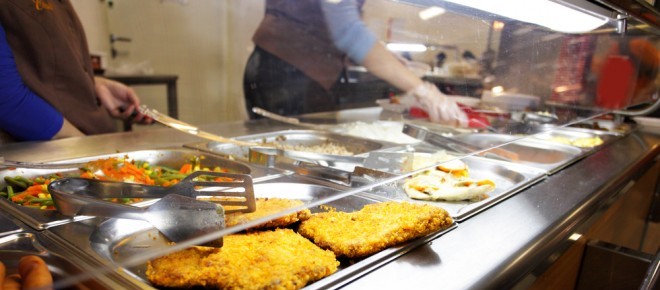Hungry for a cause? Look closer at that cafeteria tray.
National Student Food Summit shows students advancing their ideals through food
Share

Students often want to help the environment or tackle poverty but don’t know where to begin. The 10th annual National Student Food Summit, held this weekend in Toronto, showed that campus cafeterias can be good places to spark change.
Many students have no choice but to spend thousands of dollars per year on meal plans and so it’s hard to argue with them when they demand seats at the tables where major decisions about campus food systems are made. This weekend’s summit showed students using their seats at the tables to assert values that go well beyond food.
The gathering was organized by Meal Exchange, a non-profit that aims for affordable, healthy and socially just food. It’s known best for anti-hunger programs like Skip a Meal, where students donate meal points, and Trick or Eat, where they canvas for food banks at Halloween. One of the sponsors was corporate food provider Aramark.
Alia Karim, director of the Dalhousie Student Union Sustainability Office, shared the story of The Loaded Ladle, a student initiative at the Halifax, N.S. school that last year handed out 16,800 volunteer-made vegan meals. The group that founded The Ladle a few years ago did so, “in direct resistance to the corporate market-based food system on campus,” she said, indicating a group with a socialist bent. A direct action protest where they handed out meals from pots and pans into Tupperware helped them eventually win a $3 per student levy on all 17,000 undergraduates that funds their operations, plus an even bigger victory: they helped convince the Dalhousie Student Union to not renew an exclusive contract with a corporate provider, giving students more control.
Andrew McAllister, who just finished a term as Vice-President Operations of the Ryerson Students’ Union, used direct action and social media savvy to try and change Ryerson’s food system. After finding out the school’s contract with Aramark was ending this year, he surveyed students about what they wanted from their food provider and put pressure on the administration by informing a local newspaper that Ryerson had covered $5.6-million of the corporate provider’s losses. He proposed something called The Good Food Co-Op, which students would run without profit in mind. He spearheaded a marketing campaign on Twitter with the hashtag #WTFRYEFOOD, encouraging students to share pictures of bad meals. He even parked a food truck on campus (unbeknownst to administrators) and sold samples of what The Good Food Co-Op might serve. The school ended up signing with another corporation, but he at least managed to start an important conversation.
Nikki Way, who works for The Sustainable Food Initiative of the University of Alberta’s Students’ Union, became interested in food after watching a documentary about water rights in Bolivia that convinced her to boycott Coca-Cola. Since then, her interest in food has grown and her strategies have evolved. “When I first started, I was really interested in getting the big corporation out of the picture,” she says. Now she realizes how complicated food questions can be. She’s still against exclusive rights for Coke on campus but realizes some good comes from it in the form of scholarships for students. By being open-minded and working with administrators and other stakeholders, some of her efforts have borne fruit, including a campus farmer’s market that will soon open for a third year.
Jo Anne Tacorda, one of the directors of the University of Toronto’s chapter of Meal Exchange, says students are interested in food because it touches so many issues, from race relations to the environment. “When I started university I didn’t have any ideas about what goes on, beyond me buying something in the cafeteria,” she says, adding, “it’s like a maze but worthwhile to step into.”